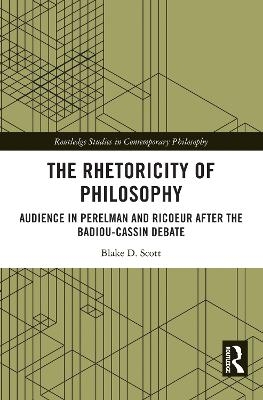
The Rhetoricity of Philosophy
Audience in Perelman and Ricoeur after the Badiou-Cassin Debate
Seiten
2024
Routledge (Verlag)
978-1-032-68487-1 (ISBN)
Routledge (Verlag)
978-1-032-68487-1 (ISBN)
This book aims to recast the way that philosophers understand rhetoric. Rather than follow most philosophers in conceiving rhetoric as a specific way of speaking or writing, it shows that rhetoric is better understood as a dimension of all human discourse and action—what the author calls “rhetoricity”.
This book provides the first philosophical treatment of rhetoricity. It is motivated by two ongoing developments. The first is the debate between Alain Badiou and Barbara Cassin about philosophy’s relation to rhetoric. Both Badiou and Cassin are critical of rhetoric, albeit for different reasons. Second, there has been a growing resurgence of interest in rhetoric considering the recent rise in authoritarian politics as well as new forms of propaganda driven by “persuasive technologies”. This book identifies the common target of Badiou’s and Cassin’s otherwise incompatible critiques: rhetoric’s conception of audience. It offers a fresh take on the “new rhetoric” project of Chaïm Perelman and Lucie Olbrechts-Tyteca, putting their work into conversation with the Badiou-Cassin debate. The book then turns to the hermeneutic philosophy of Paul Ricoeur in search of an expanded conception of audience. It shows that Ricoeur’s hermeneutic philosophy allows us to extend Perelman and Olbrechts-Tyteca’s psychological notion of audience to texts themselves and to argue that human beings have a rhetorical capacity to reflect on audiences in search of what is potentially persuasive.
The Rhetoricity of Philosophy will be of interest to scholars and advanced students working in contemporary European philosophy, rhetoric, argumentation studies, and social theory.
This book provides the first philosophical treatment of rhetoricity. It is motivated by two ongoing developments. The first is the debate between Alain Badiou and Barbara Cassin about philosophy’s relation to rhetoric. Both Badiou and Cassin are critical of rhetoric, albeit for different reasons. Second, there has been a growing resurgence of interest in rhetoric considering the recent rise in authoritarian politics as well as new forms of propaganda driven by “persuasive technologies”. This book identifies the common target of Badiou’s and Cassin’s otherwise incompatible critiques: rhetoric’s conception of audience. It offers a fresh take on the “new rhetoric” project of Chaïm Perelman and Lucie Olbrechts-Tyteca, putting their work into conversation with the Badiou-Cassin debate. The book then turns to the hermeneutic philosophy of Paul Ricoeur in search of an expanded conception of audience. It shows that Ricoeur’s hermeneutic philosophy allows us to extend Perelman and Olbrechts-Tyteca’s psychological notion of audience to texts themselves and to argue that human beings have a rhetorical capacity to reflect on audiences in search of what is potentially persuasive.
The Rhetoricity of Philosophy will be of interest to scholars and advanced students working in contemporary European philosophy, rhetoric, argumentation studies, and social theory.
Blake D. Scott is Postdoctoral Research Associate at KU Leuven’s Institute of Philosophy. His articles have appeared in journals including Philosophy & Rhetoric, Informal Logic, Argumentation, Études Ricoeuriennes/ Ricoeur Studies, Analecta Hermeneutica, and Sartre Studies International.
Introduction 1. The Enemy of My Enemy: Philosophy, Sophistics, and Rhetoric in the Badiou-Cassin Debate 2. The Audience in Perelman and Olbrechts-Tyteca’s New Rhetoric 3. Rhetoric on Trial (I): Badiou v. Perelman 4. Rhetoric on Trial (II): Cassin v. Perelman 5. Extending the Audience: Ricoeur’s Missed Encounter with Perelman 6. Ricoeur and the Rhetoricity of Philosophy Conclusion: Is Rhetoric a Dead End for Philosophy?
| Erscheinungsdatum | 10.08.2024 |
|---|---|
| Reihe/Serie | Routledge Studies in Contemporary Philosophy |
| Zusatzinfo | 6 Line drawings, black and white; 6 Illustrations, black and white |
| Verlagsort | London |
| Sprache | englisch |
| Maße | 152 x 229 mm |
| Gewicht | 762 g |
| Themenwelt | Geisteswissenschaften ► Philosophie ► Sprachphilosophie |
| Sozialwissenschaften ► Kommunikation / Medien ► Kommunikationswissenschaft | |
| Sozialwissenschaften ► Politik / Verwaltung ► Politische Theorie | |
| ISBN-10 | 1-032-68487-9 / 1032684879 |
| ISBN-13 | 978-1-032-68487-1 / 9781032684871 |
| Zustand | Neuware |
| Informationen gemäß Produktsicherheitsverordnung (GPSR) | |
| Haben Sie eine Frage zum Produkt? |
Mehr entdecken
aus dem Bereich
aus dem Bereich
Wie die Menschheit zu ihrer größten Erfindung kam
Buch | Softcover (2022)
C.H.Beck (Verlag)
18,00 €
Macht und Legitimität politischer Sprache im Prozess der europäischen …
Buch | Softcover (2023)
Nomos (Verlag)
74,00 €


